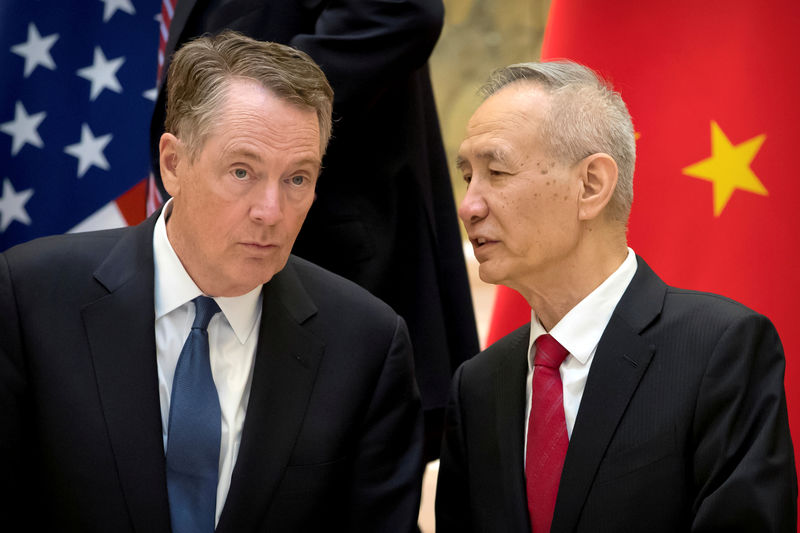By David Lawder
WASHINGTON (Reuters) - The United States will need to maintain the threat of tariffs on Chinese goods for years even if Washington and Beijing strike a deal to end a costly tariff war, President Donald Trump's chief trade negotiator told lawmakers on Wednesday.
U.S. Trade Representative Robert Lighthizer cautioned that much work was still needed to nail down a U.S.-China trade agreement, including working out how it will be enforced.
"If we can complete this effort - and again I say if ... we might be able to have an agreement that helps us turn the corner in our economic relationship with China," Lighthizer said in testimony to the U.S. House Ways and Means Committee.
The two countries have imposed tit-for-tat tariffs on hundreds of billions of dollars worth of each others' goods, roiling financial markets, disrupting manufacturing supply chains and shrinking U.S. farm exports.
Lighthizer said USTR was taking legal steps to implement Trump's decision on Sunday to delay a tariff increase on more than $200 billion worth of Chinese goods that had been scheduled for Friday.
But USTR later clarified in a statement that it was not abandoning the threat of increasing the tariffs to 25 percent from 10 percent. It said a Federal Register notice would be published this week that would suspend the increase "until further notice."
Lighthizer detailed a long road ahead to resolve U.S. China trade issues, and said that tariffs would remain an important tool to push China to make structural policy changes sought by Trump and lawmakers.
"The reality is this is a challenge that will go on for a long, long time," Lighthizer said. He earlier said he "is not foolish enough" to believe that a single negotiation will change the increasingly sour bilateral trade relationship.
"If there is disagreement at my level, the U.S. would expect to act proportionately but unilaterally," Lighthizer added.
A perennial threat of tariffs would be disappointing news for industry, which is hoping to see an end to the trade war uncertainty that has paralyzed China investment decisions.
Lighthizer's cautious comments about a China deal prospects sent U.S. stocks lower in morning trade, but Wall Street steadied somewhat after U.S. Federal Reserve Chairman Jerome Powell told a separate hearing that the Fed would stop shrinking its $4 trillion balance sheet later this year. (N)
'MOST SEVERE CHALLENGE'
The issues that the United States faces with China are "too serious" to be resolved by promises to purchase more U.S. goods and structural change by China is needed, Lighthizer said.
China has offered to purchase an additional $1.2 trillion of U.S. products over six years, people familiar with the talks have said, which would be welcome relief to farmers and businesses hit hard by Beijing's retaliatory tariffs.
But lawmakers have urged the Trump administration not to allow potential big-ticket purchases to distract him from pursuing an end to what the United States alleges are unfair trade practices.
China represents the "most severe challenge" ever faced by U.S. trade policy makers and congressional support has been "critical in persuading China" to take Washington's concerns more seriously, Lighthizer said on Wednesday.
The United States has accused Beijing of forcing U.S. companies doing business in China to share their technology with local partners and hand over intellectual property secrets. China denies it engages in such practices.
Trump administration officials also object to non-tariff barriers in China, including industrial subsidies, regulations, business licensing procedures, product standards reviews and other practices that they say keep U.S. goods out of China or give an unfair advantage to domestic firms.
Lighthizer on Wednesday said that while some progress has been made in the talks, the United States needs to be able to take unilateral action to enforce any agreement.
"I don’t believe this is going to solve all the problems between the United States and China," Lighthizer said. "We're going to be back here and working our way through problems, always with one eye toward the future."
The United States is seeking monthly meetings for lower-level officials, quarterly meetings for vice ministers and semiannual meetings at the ministerial level for the enforcement process, Lighthizer said.
Reuters first reported in January that the U.S. side was demanding such reviews of China's progress on pledged trade reforms.
Lighthizer also said the United States is seeking to prevent China from competitive devaluation of its yuan as part of a currency deal in the talks.
He told lawmakers that the negotiations are to settle China's violations of Section 301 of the Trade Act of 1974 and therefore were executive actions that did not require Congress' approval. The China talks have had more in common with a sanctions-monitoring regime than a traditional trade pact, focused on corrective actions by Beijing.
'SUBSTANTIAL' PURCHASES
While lawmakers from major agricultural states broadly shared their support for a deal that addresses these core issues, they sounded the alarm about the impact of tariffs. U.S. farmers have been among the hardest hit by retaliation from China, the top market for many of their products.
Lighthizer said Trump's team is pushing China to promise to make "substantial" new purchases of U.S. products, including soybeans, corn, ethanol and cotton.
The purchase plan is designed to secure future demand as well, he said.

"Our hope is if you increase those agriculture sales, you would create new customers and results that go out years and years and years and years," Lighthizer said.